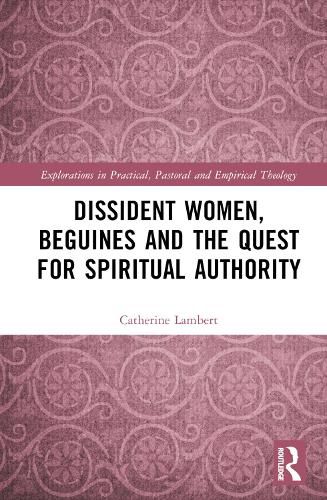Readings Newsletter
Become a Readings Member to make your shopping experience even easier.
Sign in or sign up for free!
You’re not far away from qualifying for FREE standard shipping within Australia
You’ve qualified for FREE standard shipping within Australia
The cart is loading…






Dissident Women, Beguines, and the Quest for Spiritual Authority focuses on the responses of a group of twenty-first-century women to the lives and writings of thirteenth-century beguine mystics, and reveals how the struggle to discover their own inner spiritual authority connects two groups of women across centuries.
For contemporary women who are disenchanted with the institutional church and who seek spiritual direction, models deeply rooted within the tradition may not be the most helpful. The author explores the value of exemplars from the fringes, ushering Hadewijch of Brabant, Mechthild of Magdeburg, and Marguerite Porete into the spotlight. The contemporary women studied developed a relationship with the beguines that transformed and influenced their own journeys. Their encounters underline the importance of re-membering the beguine mystics, the value of contemplative engagement with historical mystics, and the need for explicit validation of the richness of the edges of tradition within spiritual direction.
Dissident Women, Beguines, and the Quest for Spiritual Authority will be of particular interest to scholars of mysticism and spirituality as well as practical, pastoral, and feminist theology.
$9.00 standard shipping within Australia
FREE standard shipping within Australia for orders over $100.00
Express & International shipping calculated at checkout
Dissident Women, Beguines, and the Quest for Spiritual Authority focuses on the responses of a group of twenty-first-century women to the lives and writings of thirteenth-century beguine mystics, and reveals how the struggle to discover their own inner spiritual authority connects two groups of women across centuries.
For contemporary women who are disenchanted with the institutional church and who seek spiritual direction, models deeply rooted within the tradition may not be the most helpful. The author explores the value of exemplars from the fringes, ushering Hadewijch of Brabant, Mechthild of Magdeburg, and Marguerite Porete into the spotlight. The contemporary women studied developed a relationship with the beguines that transformed and influenced their own journeys. Their encounters underline the importance of re-membering the beguine mystics, the value of contemplative engagement with historical mystics, and the need for explicit validation of the richness of the edges of tradition within spiritual direction.
Dissident Women, Beguines, and the Quest for Spiritual Authority will be of particular interest to scholars of mysticism and spirituality as well as practical, pastoral, and feminist theology.